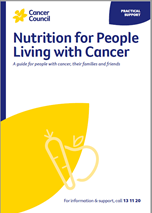- Home
- Oesophageal cancer
- Managing side effects
- Swallowing difficulties
Swallowing difficulties
You may have difficulty swallowing (dysphagia) before, during or after treatment. This may be caused by the cancer itself or by swelling in the oesophagus after surgery. Signs include: taking longer to chew and swallow; food getting caught in your mouth or throat; or bringing up food or vomiting.
Some people find that food and fluid go into the windpipe instead of the food pipe. This is called aspiration and it can lead to chest infections like pneumonia. Talk to your doctor about these symptoms.
How to manage swallowing difficulties
- Make food softer by chopping, mashing, slow-cooking, mincing or pureeing food.
- Between meals, snack on soft foods that are higher in energy and protein (e.g. avocado, yoghurt, ice-cream, custard, diced tinned fruit) and drink milkshakes.
- Chew carefully and slowly, sitting still and upright. Try to avoid talking while eating.
- Avoid dry foods such as bread, cakes, muffins and large chunks of meat. Add extra gravy or sauce to your meals.
- Wash food down with small sips of fluid.
- See a speech pathologist for help to manage these symptoms and suggestions on the types of foods to eat and ways to eat and drink safely.
- Talk to your doctor or dietitian if you are losing weight. They can help you find foods that provide enough nutrition and help you maintain your weight.
- Add special nutritional supplement drinks to your diet to help maintain your strength (e.g. Sustagen, Resource and Ensure).
→ READ MORE: Reflux and choking
Podcast: Appetite Loss and Nausea
Listen to more episodes from our podcast for people affected by cancer
Prof David I Watson, Matthew Flinders Distinguished Professor of Surgery, Flinders University, and Senior Consultant Surgeon, Oesophago-Gastric Surgery Unit, Flinders Medical Centre, SA; Prof Bryan Burmeister, Senior Radiation Oncologist, GenesisCare Fraser Coast and Hervey Bay Hospital, QLD; Kieran Cahill, Consumer; Jessica Jong, Clinical Dietitian, Upper GI and Hepatobiliary Services, Peter MacCallum Cancer Centre, VIC; John Leung, Consumer; Prof Rajvinder Singh, Professor of Medicine, University of Adelaide, and Director, Gastroenterology Department and Head of Endoscopy, Lyell McEwin Hospital, SA; Dr Sarah Sutherland, Medical Oncologist, Chris O’Brien Lifehouse, NSW; Paula Swannock, Upper GI Cancer Nurse Consultant, St Vincent’s Hospital Melbourne, VIC; Rebecca Yeoh, 13 11 20 Consultant, Cancer Council Queensland.
View the Cancer Council NSW editorial policy.
View all publications or call 13 11 20 for free printed copies.
